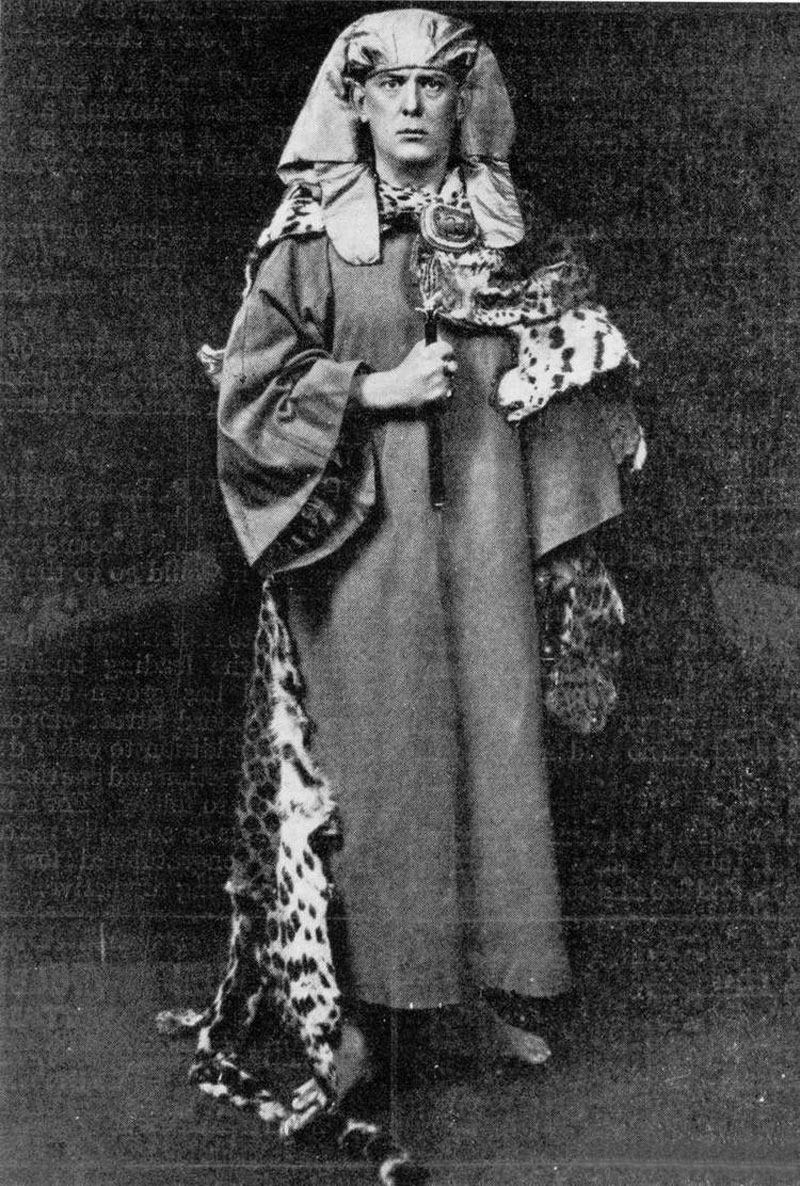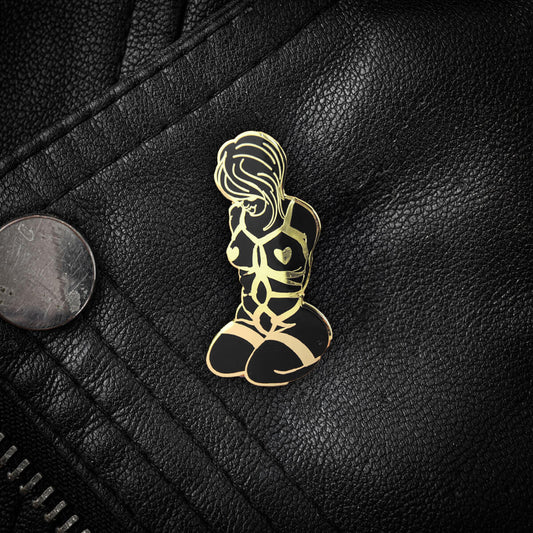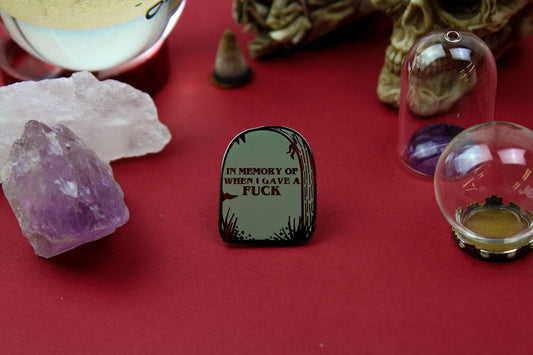
Who Are the Most Famous Occultists?
Share
The world of occultism has been shaped by a cadre of extraordinary individuals, each leaving an indelible mark on the esoteric landscape. Among the most renowned are Eliphas Levi, the 19th-century French magician and philosopher known for his groundbreaking works on ceremonial magic and the occult. Aleister Crowley, a figure of both awe and controversy, is a huge figure in modern occultism, the founder of Thelema and has left a legacy that continues to reverberate through magical and spiritual communities today. Madame Blavatsky, the enigmatic co-founder of Theosophy, was obsessed with the profound mysteries of existence, catalysing a spiritual renaissance and influencing countless seekers worldwide. Anton LaVey, founder of the Church of Satan, ignited a cultural and philosophical revolution with his provocatively individualistic take on Satanism.
These luminaries, though diverse in their beliefs and practices, share a common thread: a tireless dedication to exploring the arcane and examining the depths of human consciousness. Their contributions range from intricate rituals and philosophical treatises to the establishment of entire spiritual movements. In this article, we'll look at the lives, philosophies, and enduring legacies of these famous occultists, examining the profound impact they've had on the occult traditions that continue to captivate and inspire seekers of enlightenment and arcane wisdom.
Who Is Considered the Forefather of Modern Occultism?
The forefather of modern occultism is often attributed to Eliphas Levi, a French occultist of the 19th century. His influential writings on magic, symbolism, and the occult laid the groundwork for many subsequent practitioners. He had a profound effect on Aleister Crowley, the former member of the Golden Dawn, and the magic of the Hermetic Order of the Golden Dawn.
Levi's work, including his notable book "Transcendental Magic," introduced concepts and symbols that continue to shape occult thought and practice today. Through his pioneering efforts, Eliphas Levi earned a distinguished place in the annals of occult history, making him a pivotal figure in the evolution of this mystical tradition.

By Unknown author - Used in publicity material for The Rites of Eleusis in 1910 (see deletion discussion).
Photograph originally uploaded to Commons by Commons user Dnaspark99 as w:Commons:File:Aleister Crowley, Golden Dawn.jpg, but now deleted., Public Domain, Link
How Did Aleister Crowley Influence Occultism?
Aleister Crowley, an English spiritualist and occultist often dubbed "The Great Beast 666," left an indelible mark on occultism. His unorthodox practices and provocative writings challenged established norms. A student of Levi's early work, Crowley then founded Thelema, a spiritual philosophy that emphasises finding one's true will.
His works like "The Book of the Law" and "Magick in Theory and Practice" remain foundational texts. Despite controversy surrounding his libertine lifestyle, Crowley's impact on modern occultism is undeniable, shaping everything from ceremonial magic to new age spirituality. His legacy continues to inspire and polarise practitioners to this day.

By unklar - [1], Public Domain, Link
What Is the Legacy of Madame Blavatsky?
Madame Helena Blavatsky, a pioneering figure in modern occultism, co-founded the Theosophical Society in the late 19th century. Her magnum opus, "The Secret Doctrine," revealed esoteric teachings that amalgamated Eastern and Western spiritual philosophies. Blavatsky's work was instrumental in popularising the idea of a universal ancient wisdom underlying all religions.
Although controversial, her legacy endures in the realms of theosophy, occultism, and the New Age movement. Her work paved the way for subsequent generations of seekers and scholars, shaping the broader landscape of esoteric thought.
How Did Anton LaVey Shape Modern Satanism?
Anton LaVey, a charismatic figure, established the Church of Satan in 1966, marking a pivotal moment in the modern occult landscape. His book, "The Satanic Bible," became a foundational text for self-empowerment and individualism, drawing from elements of ritual magic, Nietzschean philosophy, and occult symbolism. LaVey's philosophy emphasised rational self-interest and rejected conventional notions of good and evil.
While controversial, his impact on modern Satanism is undeniable, inspiring a diverse array of practitioners and challenging established religious norms. LaVey's legacy endures through the Church of Satan and the broader Satanic movement, having an impact on both popular culture and occult subcultures.

Public Domain, Link
What Contributions Did Eliphas Levi Make to Occult Philosophy?
Eliphas Levi, born Alphonse Louis Constant, was a 19th-century French mystic and occultist whose works significantly shaped modern esotericism. His writings, including "Dogme et Rituel de la Haute Magie" and "Transcendental Magic," introduced key concepts like the "As above, so below" axiom and popularised the notion of the pentagram as a symbol of magical equilibrium. Levi also played a crucial role in reviving interest in the Tarot as a tool for divination and self-discovery.
His adept synthesis of Hermetic and Kabbalistic traditions with Christian mysticism greatly inspired subsequent occultists like Aleister Crowley and the Golden Dawn. Levi's impact on occult philosophy remains profound, his ideas continuing to inspire seekers of esoteric knowledge and spiritual enlightenment to this day.

By Unknown photographer - Scan from Pamela Colman Smith Commemorative Set, Public Domain, Link
How Have Women Shaped the Field of Occultism?
While occultism has historically been dominated by male figures, several remarkable women have significantly contributed to the field.
Helena Blavatsky, the co-founder of Theosophy, played a pivotal role in popularising occult thought in the late 19th century. Dion Fortune, a British occultist and author, made substantial contributions to modern ceremonial magic and esoteric philosophy. Pamela Colman Smith, an artist and occultist, illustrated the Rider-Waite Tarot deck, which remains one of the most popular and influential decks in tarot history.
These women not only broke gender barriers but also advanced occultism through their writings, teachings, and artistic creations. Their enduring impact continues to inspire a new generation of female practitioners and underscores the diverse and inclusive nature of the occult community.

By Yogananda - https://www.barkanmethod.com/youtube-video-of-paramahansa-yogananda/, Public Domain, Link
Are There Any Famous Occultists in Eastern Traditions?
It's not all about Western esotericism too - the East has its own share of renowned occultists who have left an indelible mark on the world of esoteric practices. figures such as Paramahansa Yogananda, an Indian yogi and guru, introduced millions to the teachings of Kriya Yoga and the science of spirituality. Aleister Crowley, though Western by birth, was profoundly inspired by Eastern mysticism and incorporated many elements of it into his own occult system, Thelema. The Tibetan Buddhist tradition has seen masters like Padmasambhava, who is credited with establishing Vajrayana Buddhism in Tibet, and Milarepa, a renowned poet and yogi.
Slightly closer to home, in the Middle East, the Jewish practice of Kabbalah has also seen its teachings and symbols woven into the fabric of occult traditions. This mystical branch of Judaism, focusing on the esoteric understanding of divine creation and the universe, has fascinated scholars and spiritual seekers alike. Its profound insights into the nature of being, the structure of the cosmos, and the pathways to spiritual enlightenment have provided rich material for those exploring the depths of the occult. Kabbalistic concepts like the Sefirot and the Tree of Life have become cornerstones in various occult philosophies, underscoring the interconnectedness of all things and the intricate balance of divine forces.
These figures demonstrate that occultism, with its emphasis on spiritual exploration and mystical experiences, transcends geographical boundaries and resonates across cultures and traditions.
What Role Did Occultists Play in the Renaissance?
During the Renaissance, a vibrant intellectual and spiritual awakening swept across Europe, and occultists played a pivotal role in this cultural revolution.
Visionaries like Cornelius Agrippa studied Hermeticism, alchemy, and magical practices, blending ancient wisdom with contemporary thought. Paracelsus, a Swiss-German philosopher, physician, and alchemist, challenged well established medical doctrines and introduced innovative ideas rooted in occult philosophy. John Dee, the court astrologer to Queen Elizabeth I, was not only a mathematician but also a skilled occultist who communed with angels and sought esoteric knowledge.
These figures sought to bridge the gap between the material and the spiritual, championing the idea that hidden knowledge held the key to understanding the mysteries of existence. Their contributions continue to inspire esoteric thought and practice to this day, making them pivotal figures in the history of occultism.
How Have Famous Occultists Been Portrayed in Literature and Film?
Famous occultists have frequently been portrayed in literature and film, often with an air of mystique and intrigue. Figures like Aleister Crowley, known for his provocative and enigmatic persona, have inspired numerous fictional characters, both directly and indirectly. Notably, the recent work by Terry Pratchett and Neil Gaiman “Good Omens” features a Demon named Crowley (played by David Tennant in the TV series.) In popular culture, characters akin to occultists often possess an aura of esoteric knowledge, wielding mysterious powers or seeking forbidden wisdom. Madame Blavatsky, with her pioneering role in Theosophy, has been a muse for various fictional depictions of powerful, spiritually attuned women.
Works of fiction frequently draw on the allure of occultism, weaving it into narratives that explore the boundaries between the known and the mysterious. These portrayals, whether accurate or embellished, contribute to the enduring fascination with occultists and their enigmatic pursuits.
What Controversies Have Famous Occultists Been Involved In?
Famous occultists have often courted controversy due to their unconventional beliefs and practices.
Aleister Crowley faced public outrage for his provocative rituals and writings, which were deemed scandalous in the early 20th century. Anton LaVey, founder of the Church of Satan, drew widespread condemnation for his advocacy of individualism and hedonism. Madame Blavatsky's claims of communicating with ascended masters were met with scepticism and accusations of fraudulence.
These figures challenged societal norms, inviting both fascination and backlash. Their controversial personas continue to be a subject of intrigue and debate, contributing to the mystique surrounding famous occultists.
How Have Occultists Influenced Politics and Society?
Occultists have occasionally exerted influence on politics and society, albeit often from the fringes.
Aleister Crowley's dabbling in occult practices and libertine philosophy raised eyebrows, while Anton LaVey's Church of Satan challenged traditional religious norms. Madame Blavatsky's Theosophical Society played a role in the spiritual revival of the late 19th century. While not directly shaping mainstream politics, these figures have left an indelible mark on countercultural movements and alternative belief systems. Additionally, their ideas and writings continue to inspire artists, writers, and philosophers, shaping the cultural landscape in subtle yet significant ways.
However, it's crucial to note that the impact of occultists on politics and society is a subject of much debate, with opinions varying widely on the extent of their impact.
What Are the Most Famous Works Published by Occultists?
Some of the most renowned works in occult literature have been penned by influential figures in the field.
Aleister Crowley's "The Book of the Law" is a cornerstone of Thelema, outlining its central tenets. Helena Blavatsky's "The Secret Doctrine" is a seminal text in Theosophy, delving into esoteric wisdom and cosmology. Anton LaVey's "The Satanic Bible" serves as a foundational text for modern Satanism. Eliphas Levi's "Transcendental Magic" remains a cornerstone in ceremonial magic.
These works have not only shaped the doctrines of their respective movements but have also contributed to the broader discourse on occultism and mysticism. They continue to be studied, debated, and revered by practitioners and scholars alike, underscoring the enduring impact of these famous occultists.

By https://www.openculture.com/2016/09/jimmy-page-rocks-the-theremin.html - https://www.openculture.com/2016/09/jimmy-page-rocks-the-theremin.html, CC BY-SA 4.0, Link
Who are some Late 20th and 21st Century Occultists?
In the late 20th and early 21st centuries, several prominent figures from the world of music and art openly expressed interest in occult practices.
David Bowie, a legendary musician known for his innovative sound and boundary-pushing persona, delved into occult themes, particularly during his Ziggy Stardust era. Jimmy Page, the iconic guitarist of Led Zeppelin, was drawn to Aleister Crowley's teachings and even purchased Crowley's former residence, Boleskine House. Matt Skiba, lead vocalist of Alkaline Trio and current member of Blink-182, has incorporated occult imagery and references into his lyrics and stage presence, reflecting a continued fascination with esoteric themes in contemporary music.
These artists' exploration of the occult serves as a testament to its enduring influence on creative expression and popular culture.
How Do Modern Occultists View These Historical Figures?
Modern occultists regard historical figures in the field with a complex blend of reverence, critique, and reinterpretation.
While acknowledging their pioneering contributions, contemporary practitioners often engage with these figures critically, recognising that societal contexts and beliefs have evolved since their time. They may extract valuable insights from their works while also challenging certain dogmas or outdated perspectives. Additionally, modern occultists are keen on integrating diverse cultural and philosophical influences, viewing historical occultists as part of a broader tapestry of wisdom traditions.
By contextualising their teachings within a contemporary framework, today's practitioners engage in a dynamic dialogue with the legacy of these famous occultists, evolving and adapting their philosophies to suit the needs and aspirations of the present age.
What Is the Lasting Impact of These Occultists on Contemporary Practices?
The lasting impact of famous occultists on contemporary practices is profound and multifaceted.
Their pioneering works laid the foundation for modern occult thought, shaping the way practitioners approach magic, mysticism, and esoteric philosophy. Concepts introduced by figures like Aleister Crowley, Madame Blavatsky, and Eliphas Levi continue to be integral to contemporary occultism. Moreover, their influence extends beyond the occult community, permeating popular culture, art, and literature. Many of their ideas have been integrated into broader spiritual and metaphysical movements.
While contemporary practitioners may offer new interpretations and adaptations, the legacy of these occultists endures as a vital source of inspiration and guidance for those navigating the intricate realms of the esoteric and mystical.
To learn more about the occult, check out our article 'what is the occult?'.













